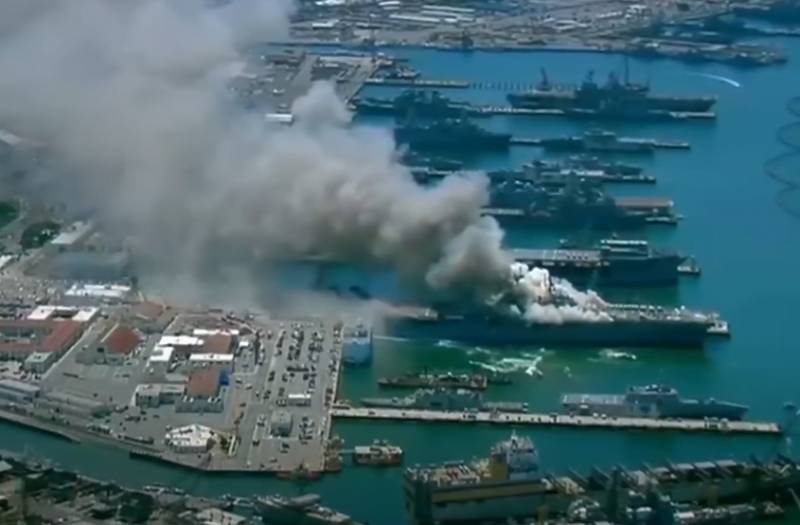The US Navy creates a new fire safety agency due to the "critical unpreparedness" of sailors to extinguish fires
As a result of a series of inspections in the US Navy, a sad fact was revealed: sailors do not know how to extinguish fires in a port, and in a critical situation this can lead to very disastrous consequences. The command of the Navy decided to create a special oversight board that will oversee the improvement of fire safety fleet... This was stated by the Deputy Chief of Naval Operations of the US Navy, Admiral Bill Lesher.
The Learning to Action Council will be similar to the Readiness Reform Oversight Council (RROC), chaired by a Deputy Secretary of the Navy, and will include Assistant Secretary of the Navy for Energy, Environment, Engines, Personnel, Navy Commanders and Chief headquarters of the Navy.
The basis for the creation of a new body was the unavailability of the crews of warships revealed during the inspection to fight fires during repairs in ports. Navy analysts have prepared a report that analyzes fires on ships of the US Navy.
- Admiral Bill Lesher, deputy head of the Naval Operations Department, told reporters.
Although the admiral stressed that most of the crews still successfully cope with the tasks of extinguishing fires, but "some are difficult." These words, of course, mask a problem that is really serious for the American navy. At the heart of this problem is a combination of factors: this is the wrong tactics, and the low level of training of personnel, and low-quality equipment.
The readiness of ship crews to extinguish fires will increase with regular fire safety training. Moreover, the emphasis, taking into account the existing gaps, should be done on practicing actions to extinguish fires in ports. It is in this direction that American sailors demonstrate a low level of readiness.
According to analysts, 13 of the 15 fires on the ships occurred while the ships were at the docks for maintenance. During the repair, fire safety rules were violated, and the sailors could not respond quickly and efficiently to these fires. One example is the fire at the Bonhomme Richard UDC. The investigation believes that this was a deliberate arson, carried out by a sailor, who thus decided to take revenge on the command. The preliminary materials of the investigation say that in the first minutes, when the fire could be contained, the crew did not take proper measures. As a result, the ship received critical damage, and now it is being prepared for shipment for cutting into metal.
Naval Surface Forces Commander Vice Admiral Roy Kitchener told reporters in July that additional fire safety officers would be deployed to the Navy to assess firefighting training. He also promised new equipment for detecting fires on ships. Fire safety officers will also have to ensure that ship personnel conduct fire safety checks during repair work in ports.

Information